Bespoke British Wool Floor Rugs
Floor rugs are an excellent addition to any home or office, adding warmth, texture and personality to a space. When it comes to selecting the perfect material for your rug, there are many options available but none quite compare to British Wool.
As a family business, we have been supplying custom made rugs and carpets for over 50 years with customers requesting all sorts of designs and combinations of different fibres but for this blog post, we'll explore the reasons why British Wool is an ideal choice for bespoke floor rugs and always our first reccomendation.
Short on time? TL;DR Summary:
-
British Wool has several benefits that make it an excellent choice for bespoke floor rugs. Firstly, it is a natural, renewable, and biodegradable material, making it an environmentally friendly option. Secondly, it is incredibly durable and hard-wearing which means that it can stand up to high traffic areas without showing signs of wear and tear. Finally, British Wool has excellent insulation properties, which means it can help to keep a room warm in the winter and cool in the summer.
-
Creating a bespoke floor rug involves several steps, including designing the rug, selecting the wool, dyeing the wool and weaving the rug. When it comes to selecting the wool, British Wool is an excellent choice due to its quality and versatility. There are many different breeds of sheep in the UK, each with their unique wool characteristics which means that there is a wide variety of textures, colours and patterns available. This variety allows for a high degree of customisation when it comes to designing bespoke floor rugs.
-
Bespoke floor rugs made from British wool offer several benefits that make them an excellent choice for any home or office. The natural, durable and versatile qualities of British Wool make it an ideal material for creating unique and personalised rugs that will last for many years to come. If you're considering investing in a bespoke floor rug, British Wool is undoubtedly an option worth exploring.
The Benefits of Using British Wool
British Wool is an excellent choice for floor rugs due to several benefits (or ‘woolabilities’) it offers. Firstly, wool is a natural, renewable and biodegradable material, making it an environmentally friendly option. Unlike synthetic materials that are often made from non-renewable resources and can take hundreds of years to decompose, wool is a natural protein fibre that comes from sheep. Wool is produced every year, and sheep can continue to produce wool for their entire life, making it a sustainable material.
Secondly, British Wool is incredibly durable and hard-wearing which means that it can stand up to high traffic areas without showing signs of wear and tear. Wool fibres are naturally resilient and they have the ability to bounce back after being compressed, making wool rugs resistant to crushing and matting. This durability means that a wool rug can last for many years without losing its shape or texture, even with regular use.
Finally, British Wool has excellent insulation properties which means it can help to keep a room warm in the winter and cool in the summer. Wool fibres have tiny pockets of air that trap heat and create an insulating layer, making wool rugs an excellent choice for adding warmth and comfort to a space. Wool is also naturally breathable, which means it can help to regulate the temperature in a room, making it an ideal material for year-round use.
In addition to these benefits, British Wool is also a high-quality material that is produced to strict standards. The UK has some of the highest animal welfare standards in the world which means that the sheep that produce British Wool are well-cared for and their welfare is prioritised. The quality of British Wool is also ensured by the British Wool Marketing Board which grades and sells wool from over 40 different breeds of sheep. With such certification, customers can be assured that they are purchasing a high-quality material that has been produced ethically and sustainably.
Overall, the natural, durable and insulating properties of British Wool make it an excellent choice for bespoke floor rugs. Not only is it a sustainable and renewable material but it also offers exceptional performance and quality that can stand up to the demands of everyday use.
The Process of Making Bespoke Floor Rugs from British Wool
Our process for creating a bespoke floor rug involves the following steps:
Selecting the wool
Designing the rug
Spinning wool into yarn
Dyeing the wool/yarn
Weaving and backing the rug.
We begin all our custom wool rug (or carpet) projects from the fibre-up as it’s very important to ensure we use the right fibre to meet the customer’s requirements.
Our first port of call is always British Wool which is an excellent choice due to its quality and versatility. There are many different breeds of sheep in the UK, each with their unique wool characteristics which means that there is a wide variety of textures and colours available. For example, the wool from the Herdwick sheep is coarse and hard-wearing, while the wool from the Bluefaced Leicester sheep is fine and soft. The wool from the Jacob sheep can be spun into a variety of colours, while the wool from the Shetland sheep is known for its warmth and softness. This variety allows for a high degree of customisation when it comes to designing bespoke floor rugs.
Once the wool has been selected, we begin design.
There are a lot of variables to play with when it comes to designing a bespoke floor rug, from pile depth to yarn combinations, to shapes and sizes. The only limitation is overall size but as long as we’re within our limits, we’re able to produce just about any shape in almost exact sizing. This means minimal waste and an efficient use of wool/yarn.
Usually our customers already know what they would like by the time they make contact but if not, a quick consultation to review options and advise on costings is usually all that’s needed. We plan the project and calculate yarn weights for each shade required before getting artwork signed off by the customer.
When we have all our design work completed and the customer happy to progress, we need to prepare our yarn. While we carry our own carpet yarn, not all yarns are the same so sometimes we need to custom spin or source it. Floor rugs usually perform best with a sturdy woollen spun yarn, either 100% wool or a high-wool blend (such as 80% wool) but worsted yarns or specialy wool blends (such as wool/silk or wool/cashmere) are also achievable.
When it comes to dyeing, there are two approaches; dye the wool and then spin or spin yarn and they dye. Both methods have their merits but we find that dyeing wool first is best when working with worsted yarns (where the wool has been combed into a ‘bump’ or giant ball of wool top - we will discuss this in a future blog) but if we only require a small amount of yarn in each shade, it’s often easier to hank-dye small lots.
British wool takes dye very well and the variety of sheep breeds means that there is a vast range of natural colours available. For example, the wool from the Black Welsh Mountain sheep is naturally black while the wool from the Ryeland sheep is naturally white. Dyeing can also create a range of vibrant colours that can be used to create bold and unique designs.
“While we have many British Wool yarns available to us, we carry good stock of a Real Shetland Wool yarn that I developed for The Real Shetland Company, this is wool that is sourced exclusively from the Shetland Islands. The 7 undyed natural shades in our Real Shetland Wool yarns are a pleasing selection of browns, greys and the classic traditional Shetland black which more of a very warm dark moorit.”
Of course, not all needs to be dyed. British sheep grow a wide range of natural shades, some in more supply than others. These range from classic creamy whites through to a large spectrum of natural browns (or moorits), greys and blacks.
While we can custom-dye wool or yarn to customer requirements, personally, I prefer trying to find a natural option to begin with and we’re fortunate to have a very popular undyed colourbank available in our own-brand Real Shetland Wool carpet yarns to offer.
When we have finished preparing our wool yarn, it is ready to be woven into a rug. The weaving process involves interlocking the yarns to create a dense, sturdy fabric that will stand up to the demands of everyday use. There are several different weaving techniques that can be used, including hand-knotted, hand-tufted, and machine-woven. Each technique has its unique advantages and can create a different look and feel for the rug.
When creating a bespoke floor rug, the design is entirely up to the customer. They can choose the size, shape, colour, texture, and pattern of the rug to create a unique piece that reflects their personal style and complements the space where it will be placed. Whether it's a bold geometric pattern or a subtle tone-on-tone design, a bespoke floor rug made from British wool can add warmth, texture, and personality to any room.
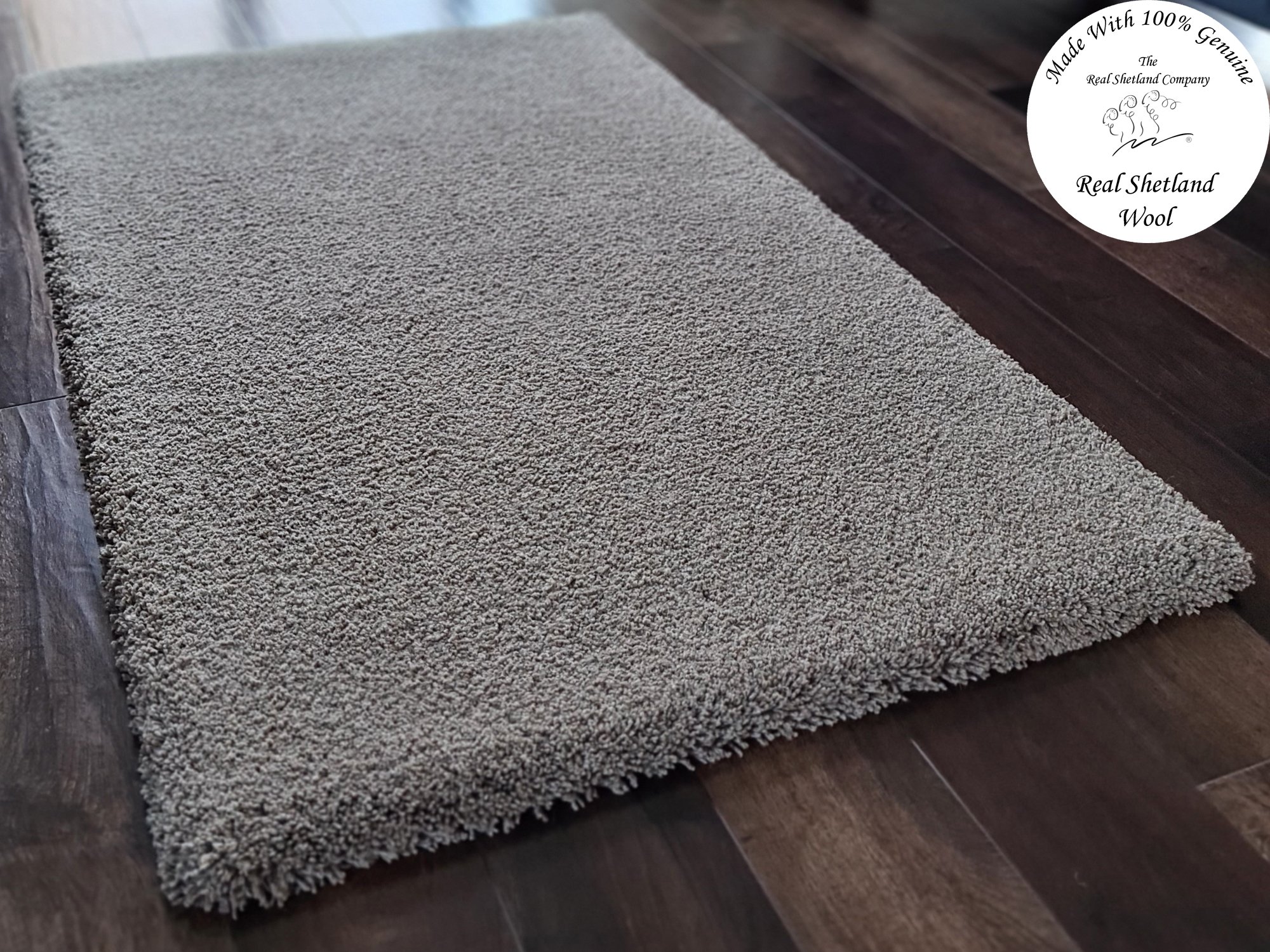
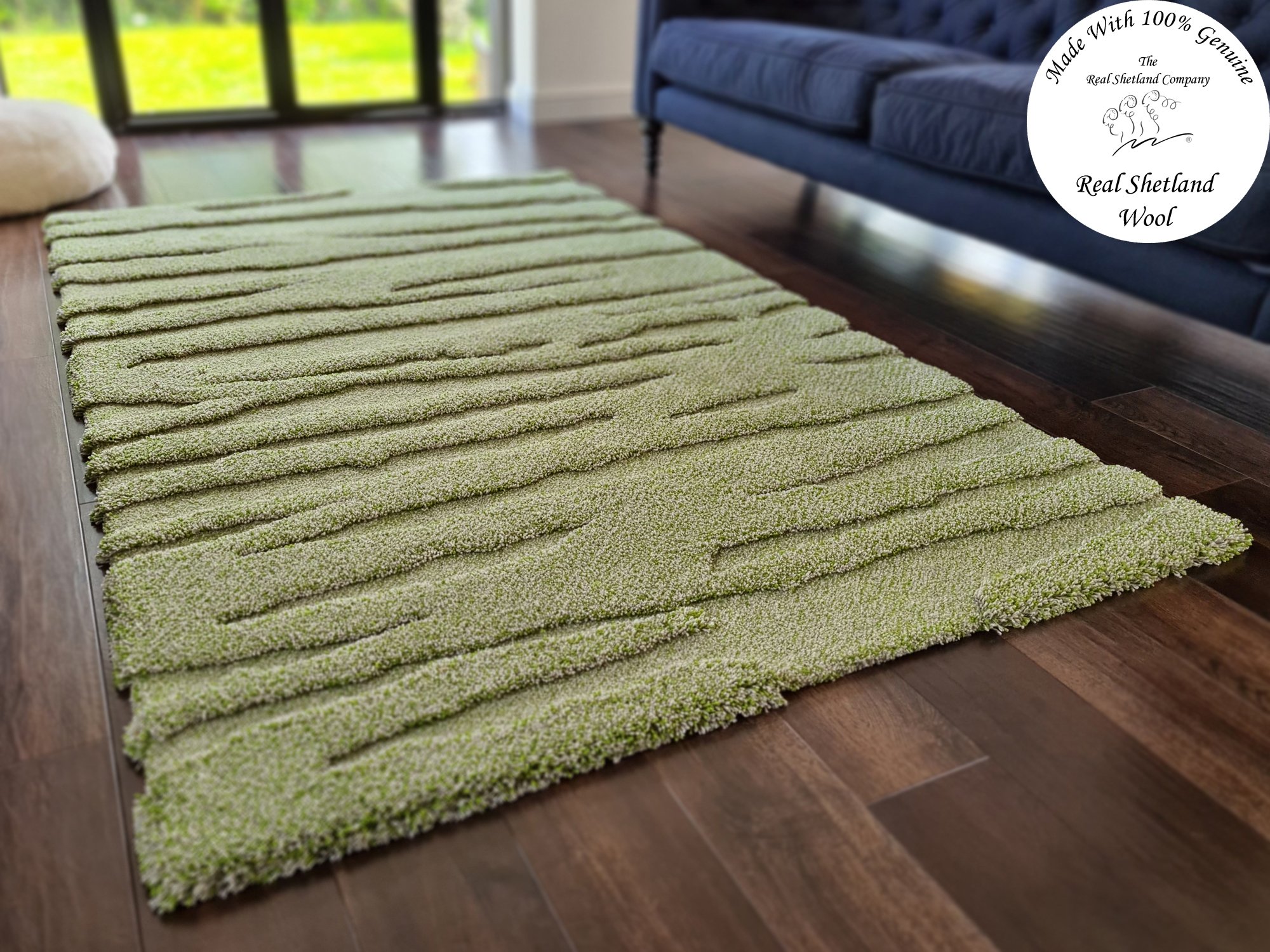
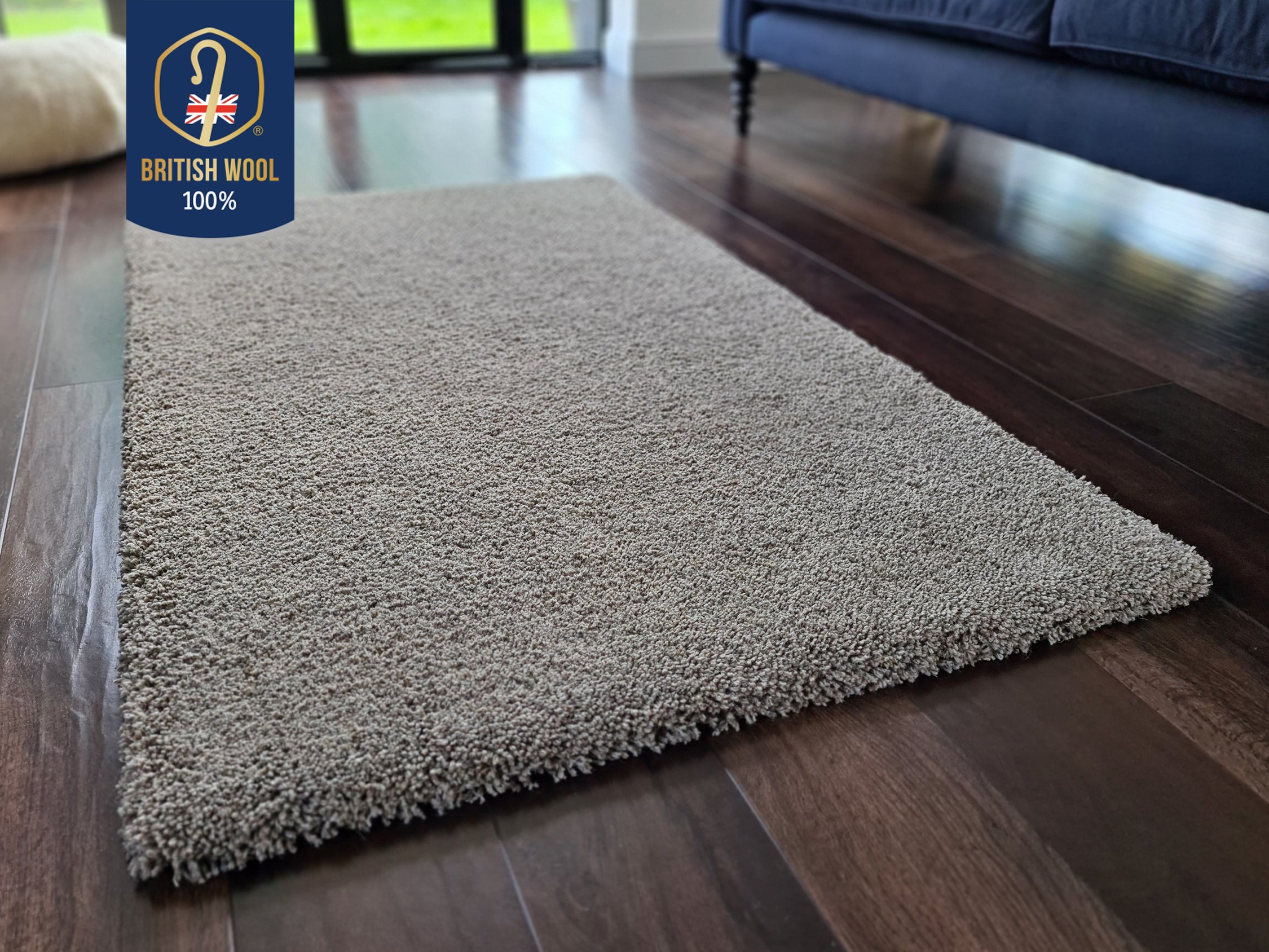
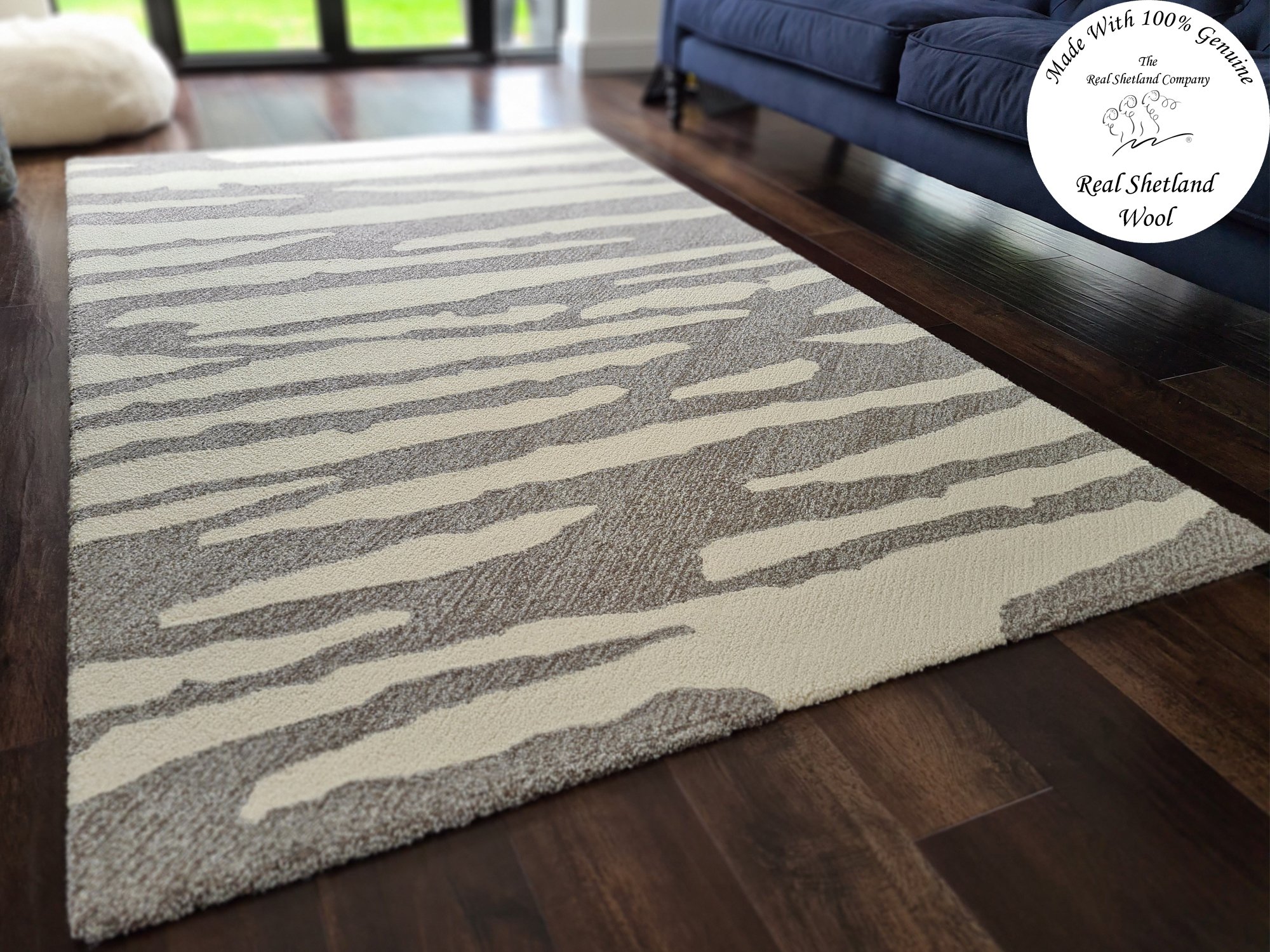
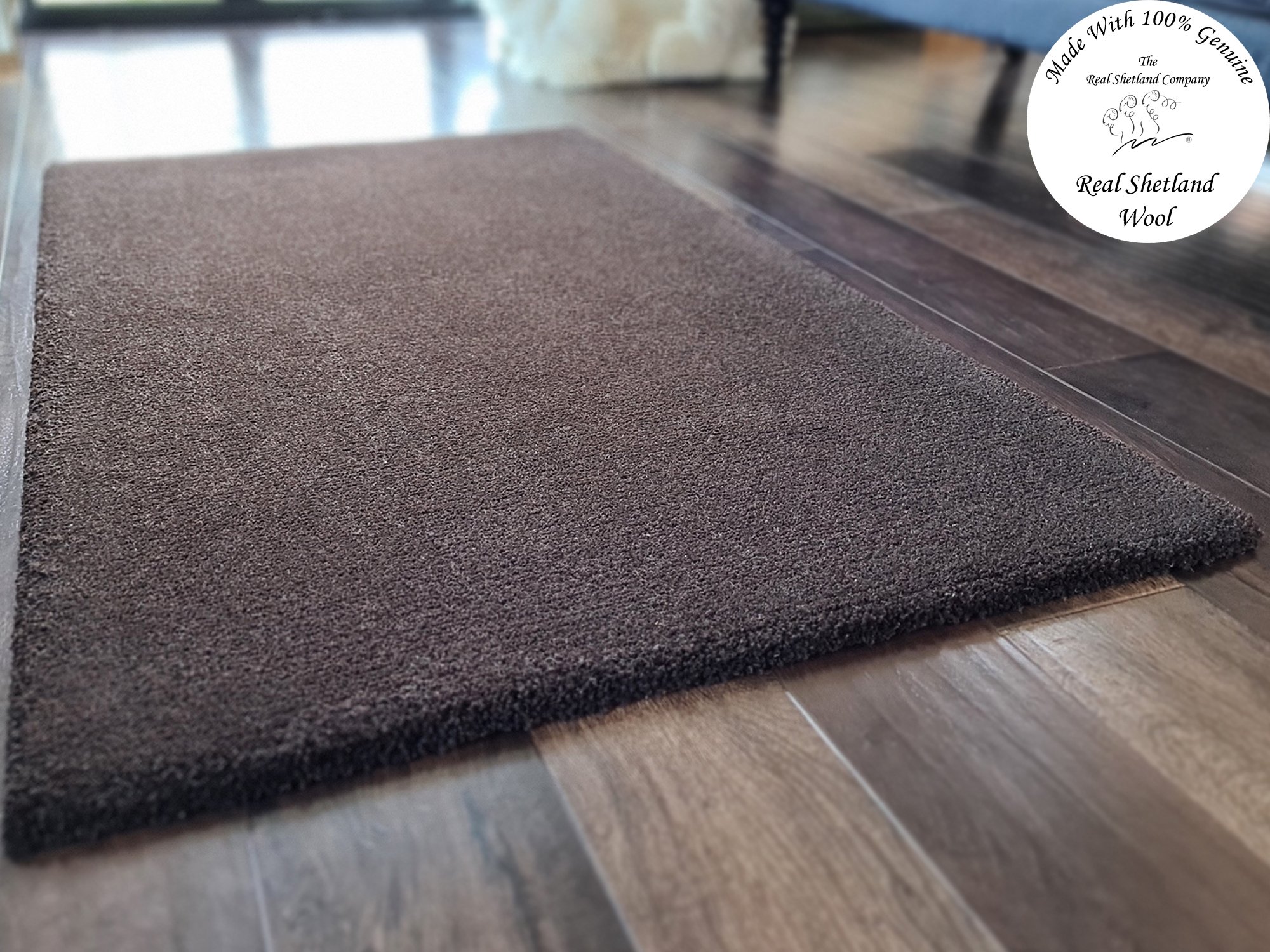
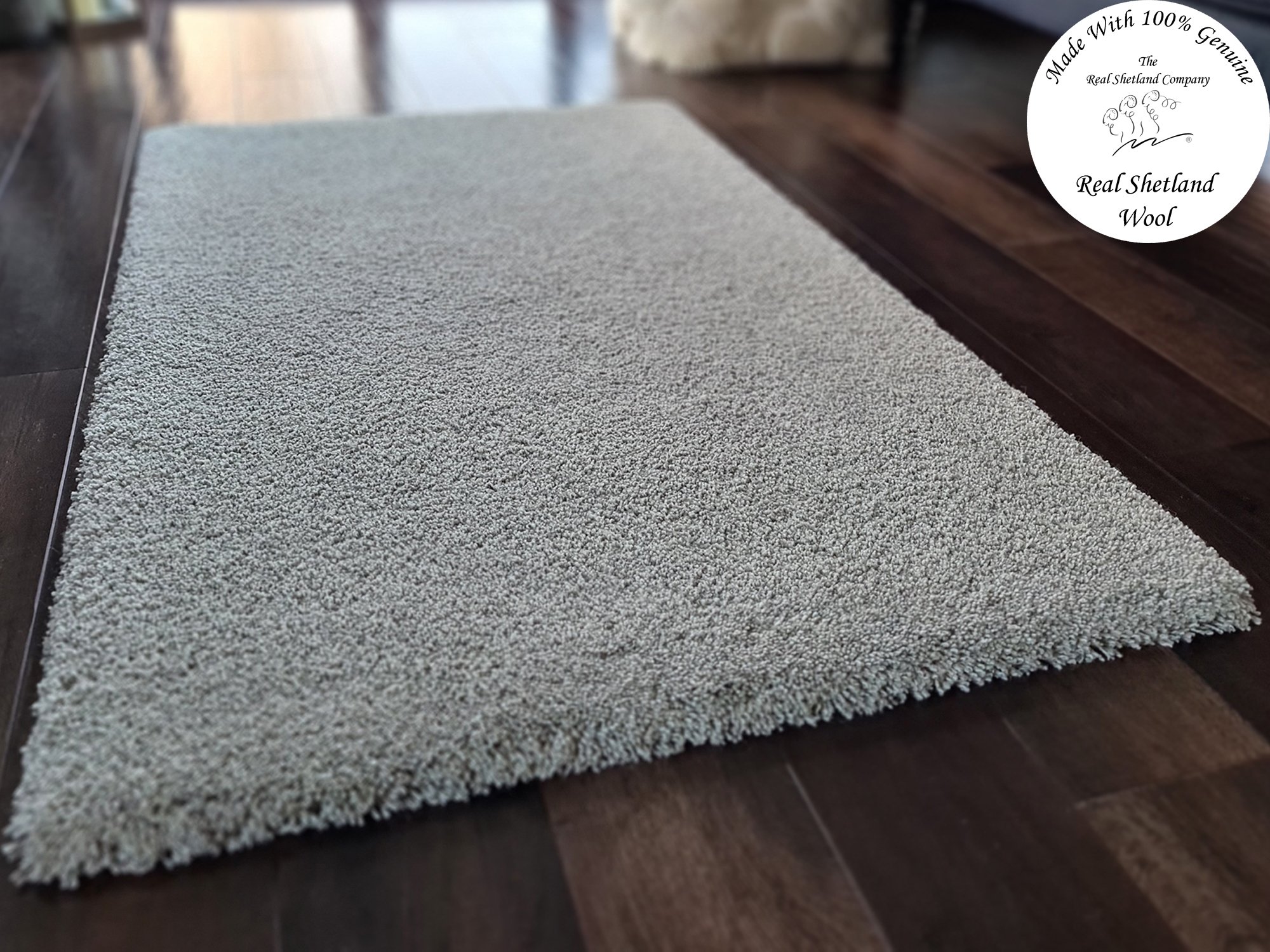
In conclusion, the process of producing a bespoke floor rug from British wool involves selecting the wool, (if necessary) spinning yarn then dyeing it and finally weaving it into a rug using different techniques.
The variety of sheep breeds in the UK means that there is a wide range of natural colours and textures available, allowing for a high degree of customisation. Creating a bespoke floor rug is an opportunity to design a unique and personalised piece that complements the space it's in and reflects the owner's personal style.
Why Choose a Bespoke Floor Rug Made from British Wool?
Choosing a bespoke floor rug made from British wool offers several advantages over mass-produced rugs made from synthetic materials.
Firstly, a bespoke floor rug can be designed to fit the exact specifications of a room, including the size, shape, and colour. This level of customisation allows for a rug that complements the existing décor and ties the room together. Unlike mass-produced rugs which may only come in standard sizes and limited colours, a bespoke rug can be made to the exact measurements needed and can be designed to match specific colour schemes.
Secondly, a bespoke floor rug made from British wool is a high-quality and durable piece that can last for many years. Wool fibres are naturally resilient and have the ability to bouncebackability after being compressed, making wool rugs resistant to crushing and matting. This durability means that a bespoke wool rug can withstand heavy traffic areas without showing signs of wear and tear, making it an excellent investment for the home.
The various ‘Woolabilities’ of wool, courtesy of The Wool Carpet Focus Group.
Thirdly, choosing a bespoke floor rug made from British wool is an environmentally conscious choice. Wool is a renewable and biodegradable material which means that it has a low environmental impact compared to synthetic materials. Mass-produced rugs made from synthetic materials can have a significant environmental impact due to the resources needed to produce them and the fact that they do not biodegrade.
Finally, choosing a bespoke floor rug made from British Wool supports local farmers and the British Wool industry. The UK has a rich history of wool production and many farmers rely on the wool industry as a source of income. By choosing a bespoke floor rug made from British Wool, customers can support these farmers and help to sustain the wool industry in the UK.
If you would like to learn more about why wool is such a super-fibre, please take a moment to visit The Campaign for Wool website. The Campaign has done a fantastic job of promoting natural wool and educating people about how we need to take a step back from synthetic materials in our everyday lives. You can also find them on their various social media accounts (@campaignforwool).
If you would like to discuss your own custom rug or custom carpet project, please drop us a line. With over 50 years experience with wool floor coverings, you are in good hands and happy to discuss your your options or offer guidance.
If you’re already a customer of ours, we’d love to see where your floor rug now calls home so please post a photo on social media and tag us. Our various social accounts are below…
Thank you for taking the time to read our latest blog and most of all, supporting British Wool!





